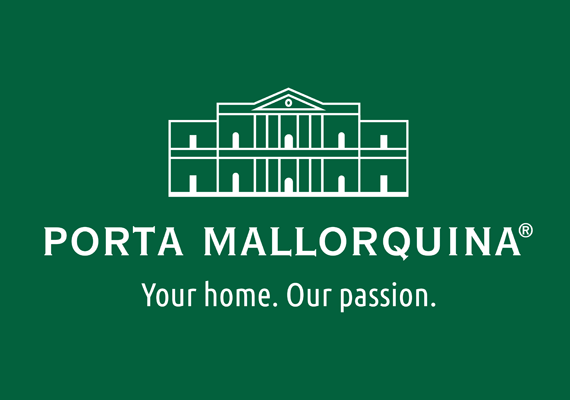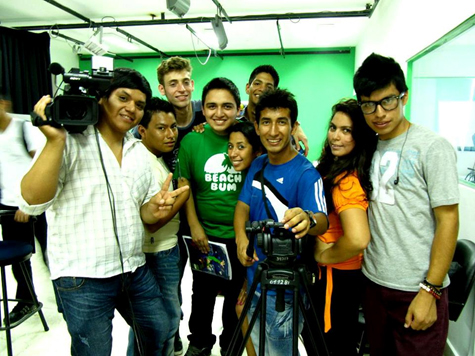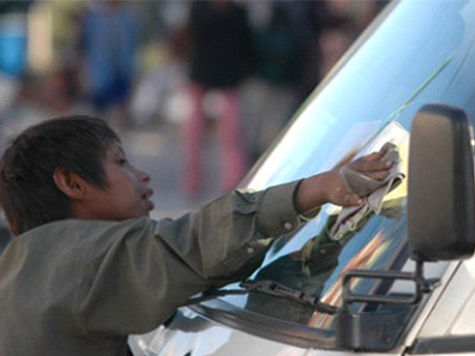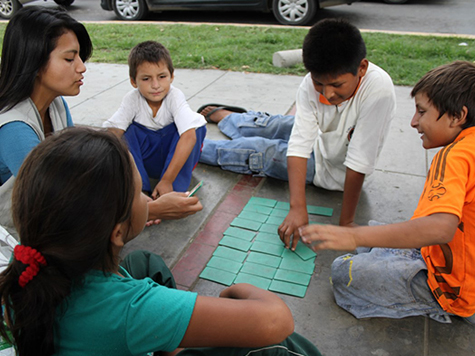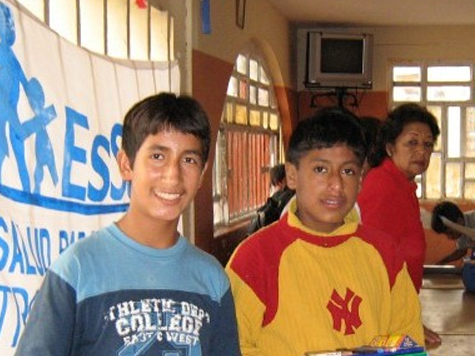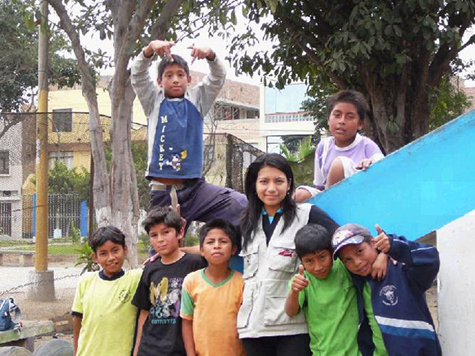For over 10 years Mundo de Niños has been successfully reintegrating street children into society in Peru. Now the project is in danger. You can help with a donation.
Elizabeth Kelly-Semrau, the wife of Porta Mondial founder Joachim Semrau, shows a group photo of students laughing happily for the camera. It is hard to believe that just five years ago one of them – Elmer Machuca Chacón– was still cleaning car windscreens on the street to boost his family’s income.
Our story takes place in Trujillo, in the north of Peru. With over 760,000 inhabitants, it is the country’s second largest conurbation after Lima. Abandoned by her husband and the father of her two children, and with little schooling or professional training, the mother of Elmer and his sister Magaly struggled to earn a livelihood as a washerwoman, offering her services from house to house. The family lived on the edge of the city in a shack roofed with reeds and tarpaulins, without electricity or water. There were no beds or proper furniture in the small space. The family slept on a pile of old mattresses that they had scavenged from a rubbish tip.
Instead of going to school Elmer spent most of his time on the streets, trying to earn some more money for the family. His fate seemed sealed: no education, no work, no future. Nobody knows exactly how many street children there are in Peru as they are not centrally registered, but some say there are as many as 500,000. The statistics and figures are not so important, however, because whether there are 5,000, 50,000 or 500,000, it is still far too many.
Seven-year-olds sleeping by the roadside
Like Elmer, some street children support their families; most however prefer to leave home voluntarily and live alone on the streets, rather than face continued mistreatment ranging from domestic violence to sexual abuse. The street children’s lives are a daily battle for survival. These children know no social rules: the only social bond that they have is with their partners in misery, and they keep their heads above water with casual jobs or theft. The youngest of them are often only seven years old. They live in constant fear of the police, criminals and older street children who imprison, rob, mistreat or rape them. To forget, they sniff the street children’s drug of choice, “Terokal”, a glue used by cobblers.
Streetworker Diana Trujillo Cleto is familiar with the fate of these children. Under the aegis of the aid organisation Mundo de Niños, she regularly goes to the places where street children congregate. With the help of a great deal of patience and sensitivity, she slowly builds up trust with the children. The children know her but they are shy and have learned early on that nobody can be trusted. Refusing to give up, however, Diana organises football matches and other activities. Slowly the children start to open up – they play, have fun and, for a short while, they finally have the chance to “simply be children”.
A home for street children
Diana also tells the children about Mundo de Niños, a place where they can regain their future. This non-profit organisation – founded in 2001 by Andreas Clamer, a German living in Spain – runs a home for street children aged from 7 to 15 in Huanchaco, a well-known beach resort 13 km from Trujillo. In 2009 Mundo de Niños opened a second home for 16 to 20-year-olds in Trujillo. In both places, the children are looked after day and night by qualified personnel. The social reintegration of these often traumatised and drug-addicted children is a laborious process and is professionally overseen by specially trained teachers, psychologists and social workers. The children are gradually introduced to the basic rules of socially acceptable coexistence; they learn to respect the property of others, give up the language of the streets, and discover that conflicts can also be resolved without violence. Their return to school is a major element of the educational programme. The children are also introduced to creative work in the organisation’s own workshops, and they learn how to use tools in preparation for later vocational training.
Elmer too heard about Mundo de Niños in this way. In 2007 he finally arrived at its door, and thus seized the chance of a better life. Living at the home, he not only completed his regular schooling, but then went on to earn a “Technical Bachelor” degree. He is now studying communication sciences at the University of Trujillo. He also continues to support his mother and sister – who no longer live in a shack but in a solidly built house – although to avoid missing school, he only takes on holiday jobs.
Street children’s home threatened by closure
At the moment Mundo de Niños is looking after 22 boys aged from 7 to 19. The project is financed by private donations from both individuals and companies such as Porta Mondial AG. To date, its main partner is the Spanish MERIDIONAL Foundation, but the effects of the Spanish economic crisis are making themselves felt for the first time this year. For financial reasons, Meridional can not cover all the costs of operation of Mundo de Niños in 2013 which is why Andreas Clamer and his team urgently need more partners and donations, so that the organisation can continue its invaluable work.
The Semraus have been supporting the organisation for years and, as a Spanish partner, Porta Mallorquina has also made regular donations to the project. From 2013, Porta Mondial AG will be making an allocation for the aid organisation in its CSR (corporate social responsibility) budget. Explaining this decision Joachim Semrau said:
“As realtors, every day we experience the pleasure of finding new homes for families. It is therefore logical for us to make a charitable commitment to a project that gives street children a home.”
Mundo de Niños’ motto is: Everyone has the right to a future. You can make this possible with a donation.
Account name: Mundo de Niños e.V.,
Account No.: 7495507403 , Sort Code: 600 501 01
IBAN: DE29 6005 0101 7495 5074 03, BIC/SWIFT: SOLA DE ST
Baden Württembergische Bank Karlsruhe (BW-BANK)
Note: Since all administrative and travel costs are borne by the organisation members themselves, the children’s home benefits directly from all donations.
More information about Mundo de Niños:
